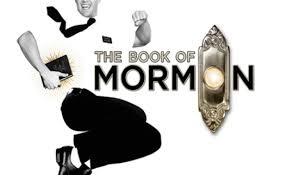The Book of Mormon (2016)
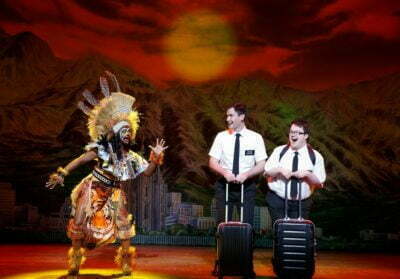
Book, Music, and Lyrics by Trey Parker, Robert Lopez, and Matt Stone
Directed by Casey Nicholaw and Trey Parker
Choreographed by Casey Nicholaw
Musical Supervision by Stephen Oremus
Produced by Broadway in Chicago
Profanity and Scatology Make a Feel-Good Story
Before Hamilton arrives at The PrivateBank Theatre this fall, the last new musical to cause a sensation on Broadway, The Book of Mormon, is playing through the summer. Fans of Trey Parker and Matt Stone’s long-running adult cartoon South Park will be familiar with the two’s delight in filling their show with musical and dance numbers, as well as ripping authoritarian religions, and know that Mormonism has a weird, special place in the comic duos’ hearts. The Book of Mormon, now five years old, has returned to Chicago for second time in two years, still wildly popular, but more of a known entity. As much of the show’s satire is aimed at the clichés of so-called Golden Age musicals as at do-gooder fantasies of Africa, and the laughs still roll easily. But they now do so with the ease of familiarity, much like how watching a classic South Park episode becomes tinged with sentimentality.
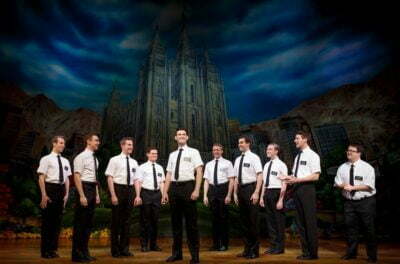 The story depicts eighteen-year-old Mormon missionaries Kevin Price (Ryan Bondy) and Arnold Cunningham (Cody Jamison Strand), who have been dispatched to northern Uganda to win souls for the Church of Jesus Christ of Latter Day Saints. Elder Price was known to his peers as a child prodigy, and expects to easily become the most successful missionary in the church’s history, despite his disappointment with his unhospitable location and obnoxious partner. Elder Cunningham is a socially inept nerd and pathological liar who has been unable to retain any friends, and quickly gets on everyone’s nerves. As for Uganda, it’s depicted as a nightmarish hellscape straight out of the most lurid fantasies of Victorian white man’s burden imperialists and Kony 2012-style paeans to humanitarian interventionism, which at their core, can be dangerously similar. Will our theoretically lovable heroes triumph over General Butt-Fucking Naked, win the girl, reconcile their differences, and ensure that each of the blaspheming villagers earns their chance to rule their own planet in the afterlife? It’s a musical, duh.
The story depicts eighteen-year-old Mormon missionaries Kevin Price (Ryan Bondy) and Arnold Cunningham (Cody Jamison Strand), who have been dispatched to northern Uganda to win souls for the Church of Jesus Christ of Latter Day Saints. Elder Price was known to his peers as a child prodigy, and expects to easily become the most successful missionary in the church’s history, despite his disappointment with his unhospitable location and obnoxious partner. Elder Cunningham is a socially inept nerd and pathological liar who has been unable to retain any friends, and quickly gets on everyone’s nerves. As for Uganda, it’s depicted as a nightmarish hellscape straight out of the most lurid fantasies of Victorian white man’s burden imperialists and Kony 2012-style paeans to humanitarian interventionism, which at their core, can be dangerously similar. Will our theoretically lovable heroes triumph over General Butt-Fucking Naked, win the girl, reconcile their differences, and ensure that each of the blaspheming villagers earns their chance to rule their own planet in the afterlife? It’s a musical, duh.
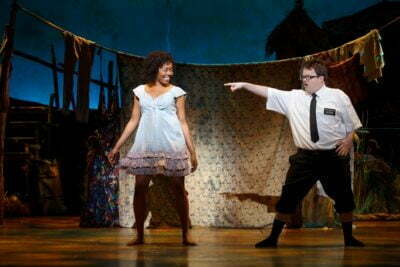
The current incarnation of The Book of Mormon tour enjoys a very strong cast, especially in its lead roles. Bondy’s Elder Price is stiff, pedantic, and selfish, but still lovable due to his youthful, sheltered innocence. Strand’s Elder Cunningham is extremely annoying, to the point where he frustrates the audience just as much as the other characters, which is, of course, part of the joke. But it’s disconcerting that he mimics the voice Trey Parker uses for Cartman while performing what is supposed to be the more generous and humble, albeit bigoted, of the leads. Candace Quarrels does well as Nabulungi, a character whose name is doomed to be butchered by Elder Cunningham every time he says it, and Sterling Jarvis is amusing as her father and semi-reliable voice of reason, Mafala Hatimbi. The major weakness in The Book of Mormon is its music. While the opening “Hello” is a delight, “Hasa Diga Eebowi” is uproarious, and “I Am Africa” is audacious enough to still make people uncomfortable, the show’s music is never complex enough to allow for its actors to demonstrate any really fine singing, and several of the songs merely push the plot along after the thrill of initially hearing their lyrics and recognizing the Broadway tradition they draw from has passed.
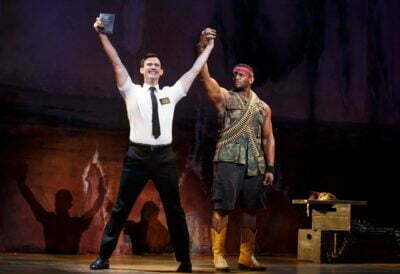
However much the charms of the music, besides the stand-out songs, may have faded, director Casey Nicholaw’s choreography is still a wondrous spectacle. The show’s climactic moment, “Joseph Smith, American Moses” is a hilarious parody of the ending of The King and I, and the peak of Parker and Stone’s irreverent treatment of religion. At least, as far as this musical goes. In South Park’s ninth season episode “Trapped in the Closet,” which aired in 2005, Parker and Stone subjected the Church of Scientology to one of the harshest critiques it had received in mainstream culture and created what was arguably a crucial turning point against its ability to create a chilling effect around itself in the media. That same critically-acclaimed season, they satirized the Terry Schiavo case as well as the Roman Catholic Church, one of their most frequent targets, and the following year attempted to take on Islam, although at that point Comedy Central reneged on their declaration to let Parker and Stone satirize whatever they pleased, and implemented a censorship procedure surrounding Muhammad which they still maintain ten years later.
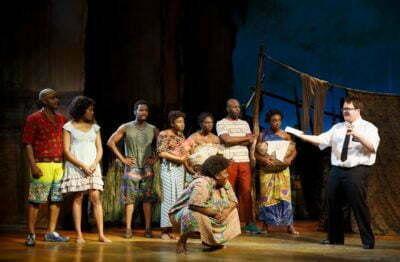
South Park’s creators have never subjected Mormonism to the full fury they are capable of, and perhaps consequently, the Latter Day Saints have been much more accepting of The Book of Mormon than other religious organizations have been of Parker and Stone’s mockery. That the Colorado-based pair have an admitted soft-spot for Mormonism is rather odd. Since this show debuted, American missionaries have contributed to the violent persecution of gay people in Uganda, including advising on a bill which broadened the criminalization of homosexuality, but was later struck down on procedural grounds. In that regard, writing what Stone called “an atheist’s love letter to religion” instead of giving missionaries the “Trapped in the Closet” treatment is a missed opportunity, since the American evangelists and their Ugandan converts have certainly not shown an ability to recognize myth and use it to spread a message of inclusivity and compassion, as depicted in this musical.
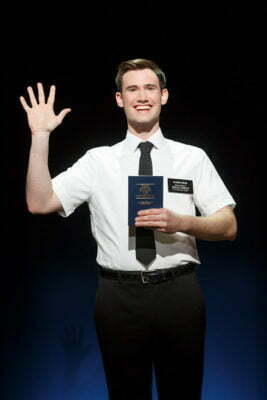
On the other hand, the export of homophobia abroad wasn’t as widely known about five years ago, and Parker and Stone could reasonably believe that people expect something different out of a musical they’ve paid hundreds of dollars to see than from a cartoon that has a six-day production process. And since The Book of Mormon is as much a meta-comment on crowd-pleasing musicals as it is on religion, it deserves to be accounted as a great success. Perhaps passionate addressing of social issues is best reserved for the ongoing TV series; as a production essentially unchanged since 2011, The Book of Mormon is best at bringing people the kind of joy musicals are so highly prized for.
Highly Recommended
Jacob Davis
Reviewed June 30, 2016
For more information, see The Book of Mormon’s page at Theatre in Chicago.
Playing at the PrivateBank Theatre, 18 W Monroe, Chicago. Tickets are $45-120; to order, call 800-775-2000 or visit BroadwayInChicago.com. Performances are Tuesdays-Fridays at 7:30 pm, Saturdays at 2:00 pm and 8:00 pm, and Sundays at 2:00 pm and 7:30 pm through August 14. Running time is two hours and thirty minutes.

